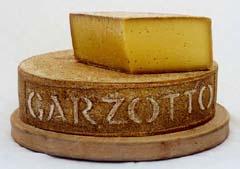Formaggio Garzotto

|

|

|
This image shows the cheese that is currently being produced on the Alpe Garzott and that is labelled "Formaggio Garzotto". Apparently, it has been produced for quite a while, but we could not yet find out for how long.
We were able to speak with the cheesemaker and his father. They live in the nearby village Aquila and produce the cheese on the Alpe Garzott. They both speak the local dialect. We found out that "zott" and "zora" correspond to "sotto" and "sopra", respectively, in Italian, which means "below" or "above" or "lower" and "upper". "Gar" seems to be a word for which there is no direct Italian translation. They said the closest word probably is "corte", which - among other meanings - means "farm". In Swiss German, there is the word "Gade" or "Gaden", which might be related to "Gar". Its meaning is a cottage, usually in the mountains, used as a stable or for people to sleep in it temporarily.
So after all, "Garzott" seems to mean something like "lower farm/lower cottage" or "untere Gade" in Swiss German.
In Italian, usually a "o" or a "a" (depending on the gender) is appended to a site name to indicate something is coming from that site. That is why the cheese is labelled "Garzotto". But also a person who comes from "Garzott" would be a "Garzotto". This, so far, is the most probable explanation of where the name "Garzotto" comes from.
And yes: Garzotto cheese tastes great! :-)
---
Das Bild zeigt den Käse, der auf der Alpe Garzott produziert wird. Dieser heisst "Formaggio Garzotto". Er wird offenbar schon seit einiger Zeit produziert, aber wir konnten nicht herausfinden, wie lange schon.
Wir hatten die Gelegenheit mit dem Käser und dessen Vater zu sprechen. Sie wohnen im nahegelegenen Dort Aquila und stellen den Käse auf der Alp her. Beide sprechen den lokalen Dialekt. Von ihnen haben wir erfahren, dass "zott" und "zora" dasselbe ist wie auf italienisch "sotto" und "sopra", also "unten" und "oben" bzw. "unterhalb" und "oberhalb". Für "gar" hatten sie keine passende italienische Übersetzung. Am nächsten käme "corte", also Hof. Es gibt aber ein schweizerdeutsches Wort: "Gade". Dies klingt nicht nur ähnlich, sondern trifft wohl auch die Bedeutung sehr genau.
Also wäre "Garzott" wohl am besten zu übersetzen mit "untere Gade" und "Garzotto" mit "Untergadener". Das "o" ist ein typisches italienisches Anhängsel, um - unter anderem - die Herkunft zu markieren. Ein Käse, der von "Garzott" kommt, heisst "Garzotto". Wäre Käse weiblich, würde er "Garzotta" heissen. Und ein Mensch, der von der Alpe Garzott kommt, ist demnach ein "Garzotto".
Dies ist derzeit die favorisierte Erklärung für die Herkunft des Namens.
Und ja: Der Käse schmeckt sehr gut!

4/15